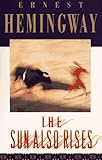An Encounter with Ecclesiastes Reality 
Yesterday I stumbled into the easiest substitute teaching assignment ever, so I had a chance to finish Ernest Hemingway’s The Sun Also Rises.
Sun was Hemingway’s break-out novel, the one which made him the most acclaimed writer of his time, and earned him recognition as the voice of the “lost generation”—those men and women whose lives had been forever altered by service in the First World War. Hemingway belonged to this generation himself—and the suppressed anguish of his novels tend to express this.
In today’s culture, where the “tomorrow is a brand new day” theme is expected to dispel the most hellish nightmare, Hemingway’s perspective hits a discordant note. Undoubtedly this is one thing that appeals to me about his work: its grittiness.
Hemingway quotes the world-weary King Solomon in his title: “The sun also rises, and the sun goes down, and hastens to the place where it rises. The wind blows to the south and goes around to the north; around and around goes the wind, and on its circuits the wind returns” (Ecclesiastes 1:5-6).
Semantically, this “sun rising” line seems similar to Scarlet O’Hara’s (Gone With the Wind) “Tomorrow is another day!” or Tom Hanks’ (Castaway) “Life will go on. The sun will rise…” Actually, you could lump any number of movie axioms or pop song credos in here. But Hemingway doesn’t intend the phrase as a hopeful mantra. And The Sun Also Rises is not about hope.
While Sun contains a lot of soaring landscapes (Hemingway cuts back on this in his next hit, A Farewell to Arms) and the typical rivers of variegated alcohol, the story’s underlying currents are latent pain and feelings of shame. The characters can’t drink, sleep, or journey away from them. Each day that ends brings another day filled with elusive dreams and internal conflict. Why? Because reality consists only of what appears in the eyes and mind, and nothing really changes.
It’s worth noting that Hemingway’s use of stream-of-consciousness is on display in Sun Also Rises, as in this sequence where his protagonist enters a church:I wondered if there was anything else I might pray for, and I thought I would like to have some money, so I prayed that I would make a lot of money, and then I started to think how I would make it, and thinking of making money reminded me of the count, and I started wondering about where he was, and regretting I hadn’t seen him since that night in Montmartre, and about something funny Brett told me about him, and as all the time I was kneeling with my forehead on the wood in front of me, and was thinking of myself as praying, I was a little ashamed, and regretted that I was such a rotten Catholic, but realized there was nothing I could do about it, at least for a while, and maybe never, but that anyway it was a grand religion, and I only wished I felt religious and maybe I would next time…
I also noted the effectiveness Hemingway has when he writes with deliberate syntactical crudeness:But I could not sleep. There is no reason why because it is dark you should look at things differently from when it is light. The hell there isn’t!
This is the counterintuitive, striking style that Hemingway pioneered and it’s ultimately what makes the blunt themes in his books jump out at you. He’s influenced countless writers, and will continue to do so. But stories like The Sun Also Rises are also needed by anyone out of touch with Ecclesiastes reality, a world where the sun rises, but God is not part of the picture. Without Christ, a brand new day may not be anything to cheer about.
::
Present on The Master Book List.
Saturday, April 01, 2006
Sun Also Rises - Hemingway, A
Posted by
AJ
at
12:47 PM
5
comments
![]()










5 comments:
Yeah, I like this review! I don't agree that the passage you quoted is true "stream of consciousness," though. To me it reads as the narrative of a stream of consciousness, in the form of an really grand run-on sentence.
This is why I like coming here. Why, I haven't thought about this novel in years, and here's a fresh perspective--and it's beautiful! Thanks.
"I don't agree that the passage you quoted is true "stream of consciousness," though..."
Yeah, you have a point there. The length of the sentence (it's the longest in the book by far) is truly breathtaking, especially if you are reading aloud. Hemingway does have a way of letting the thoughts flow, though, and lets the reader fill in the narrative or psychological gaps. Some of the conversations are like this. You have to pay attention to follow the action.
I've been meaning to say, Belinda, that you are looking younger every day. It's way beyond "well-preserved"...
HA! Learn that face well...by all indications you have that to look forward to. ;-)
I was thinking of my favorite stream-of-consciousness passages, and I decided that they are definitely those passages from Faulkner belonging to Jamie ("The Sound And The Fury") and Vardamann (As I Lay Dying). And the fact that both these characters are developmentally disabled just makes the passages that much more interesting and ingenius. Oh, heavens, I love me some Faulkner.
Everyone should read more Faulkner.
And Hemingway, of course. We should all read more Hemingway too. ;)
I got to go on a cubbing hunt with the Longreen Hunt in Germantown once...it was the club with which Faulkner foxhunted. When, in the clubhouse (a very rustic setup), I saw his name scrawled, in his own hand, among the members' names through the years, I had to touch it...and just...wow.
Post a Comment